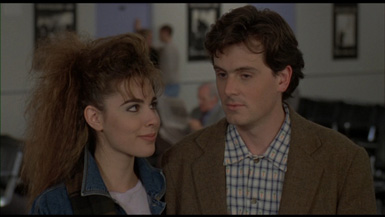|
|
Sole Criterion: Kicking and Screamingby Brett Ballard-BeachDecember 22, 2011
Kicking and Screaming is not a romantic comedy, at least, not entirely, but for the entangled couple at the heart of the story, whose romance we see on its last legs as the film opens, Baumbach lucked out with actors who possessed the same sort of ineffable je ne sais quoi that popped when Ethan Hawke meshed with Julie Delpy in that same year’s Before Sunrise. It’s not easy to encapsulate precisely what makes the chemistry of Josh Hamilton and Olivia D’Abo - who play Grover and Jane - elicit such rapturous praise. They have maybe 15-20 minutes of scenes together and nothing remotely physical takes place between them. Baumbach shoots/presents five of their six shared scenes together as flashbacks, parsed out at regular intervals throughout the film’s 96 minute running time and sharing a stylistic refrain: each starts out as a black and white freeze-frame of Jane, which then haltingly, hesitatingly comes to life (reminding me of the single frame of motion in Chris Marker’s 1962 sci-fi romance La Jette) before switching to color and normal speed. Accompanied by Phil Marshall’s spare, melancholic but somehow catchy acoustic guitar score, these moments take the film outside of itself hinting at a more serious sense of loss to accompany what one of the main characters jokingly refers to as his “nostalgia for conversations I had yesterday.”
|

|
|
|

|
Sunday, May 5, 2024
© 2024 Box Office Prophets, a division of One Of Us, Inc.


